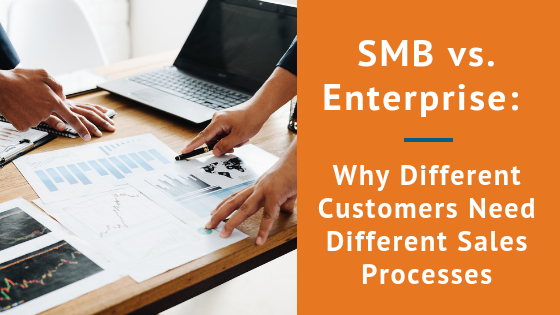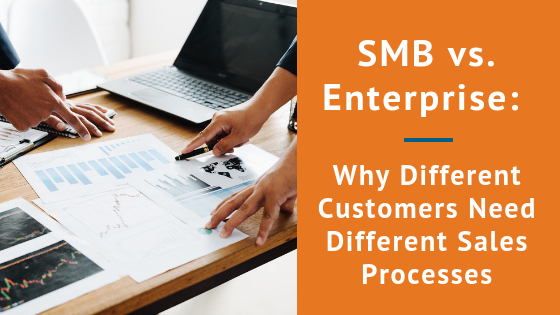
You need different sales processes for different types of customers, especially when it comes to selling technology solutions. If you are selling to enterprise customers, their needs and expectations are vastly different than when you sell to small-to-medium-sized businesses (SMBs). Those differences extend well beyond budget and include differing attitudes about their strategic needs, what they expect from you as the solution provider, and what you should expect from them in return. Understanding those differences is essential to sales success.
Of course, every sales rep wants to land those whale accounts, and selling to enterprise customers certainly delivers a big payday. However, SMBs looking for technology far outnumber enterprise-scale customers. In fact SMBs make up 99.9 percent of U.S. businesses. As Gartner notes, SMBs typically have a revenue under $50 million for a small business and between $50 million and $1 billion for a mid-sized business, which means they have a smaller IT staff and budget. However, SMBs are also tend to be the fastest growing businesses making then an extremely lucrative and market for technology.
Selling enterprise technology also can be a long and arduous process. Sales reps will target an enterprise prospect and use a more aggressive, hands-on sales approach. Enterprise selling is more proactive and requires setting up meetings with decision-makers, gaining buy-in, matching features to pain point for different departments, and identifying necessary modifications. Enterprise is a long game that requires more time, more nurturing, and more customization.
SMBs are much more self-selecting. They usually know what they need and respond to a marketing campaign because the solution may need their needs, or they find your technology through a web search. The sales process usually includes a request for more information, a demonstration, and addressing pain points with out-of-the-box features to close the contract. Much of the SMB sales process is automated in order to cast a wider net and attract more prospects.
The Demands of Enterprise Selling
With enterprise solution selling you are working with big infrastructures and tiers of decision-makers from various departments. You have to start by identifying those decision-makers at the outset and tailoring your sales pitch to address each of their needs. Typically, you want to find a champion within the organization to help you break down barriers. You will inevitably meet with multiple stakeholders numerous times, walking each through technical details and refinements that show how their group will benefit from the technology you are selling.
When selling enterprise solutions, decision-makers are thinking about strategic advantages, such as increased efficiency, shortening production time, reducing overhead, or opening new markets. Enterprise sales usually are not as constrained by budget, but there can be lack of consensus regarding benefits. Even when the decision-makers can’t decide on the value of benefits specific to their needs, you can fall back on saving money as a common benefit (although cutting costs is seldom at the top of the list).
By their nature, enterprise sales are extremely high touch. You will need to start with a customized, sophisticated sales pitch. The goal is to find the right stakeholders and get them to accept a meeting or demonstration that could lead to a proof of concept. Enterprise contracts tend to require a lot of customization, which means a lot of collaboration with the customer both during and after the sales process.
Measuring success is also different with enterprise sales. If you can make progress toward the next meeting, that’s a win. It can take up to 18 months to close some enterprise deals o winning over the next stakeholder or overcoming the next sales obstacle bring you one step closer to a final deal.
Scaling SMB Sales Strategies
SMB operations are more nimble so they can adapt to changing business needs quickly. They want easy-to-deploy technology solutions that yield fast results. They also want solutions that will plug into their existing workflow with little or no customization to address a specific problem that is costing money, restricting their competitive strategy, or inhibiting growth.
With SMBs you are dealing with smaller budgets, but you also have fewer decision-makers – 98 percent of SMB buying decisions are made by the CEO. SMBs often have a good idea of what they need. Your job is to build trust and convince decision-makers you have the right solution to meet the need quickly and cost-effectively.
Many organizations outsource their SMB sales process because much of it is block and tackle; nurturing leads, sending follow-up emails, making follow-up calls, and helping the prospect decide to buy. Where enterprise sales are high touch and highly customized, the key to success in SMB sales is to drive lead volume and be persistent in your follow up. Even for SMB sales it is crucial to have your sales vs customer success teams in sync and working together.
When approaching any sales situation, it’s important to understand the needs and expectations of your prospect. That will not only help you craft the right sales approach, it also will tell you what resources you need to close the deal, and what ROI you can expect in return. Enterprise sales and SMB sales are very different, each requiring a unique sales approach and different resources. With enterprise sales, you are using a highly personalized sales strategy to yield big returns. SMB sales success is driven by lead volume, automaton, and consistent contact with the right value-added messages, which is why outsourcing to sales-as-a-service specialists for SMB technology can yield substantial returns.







